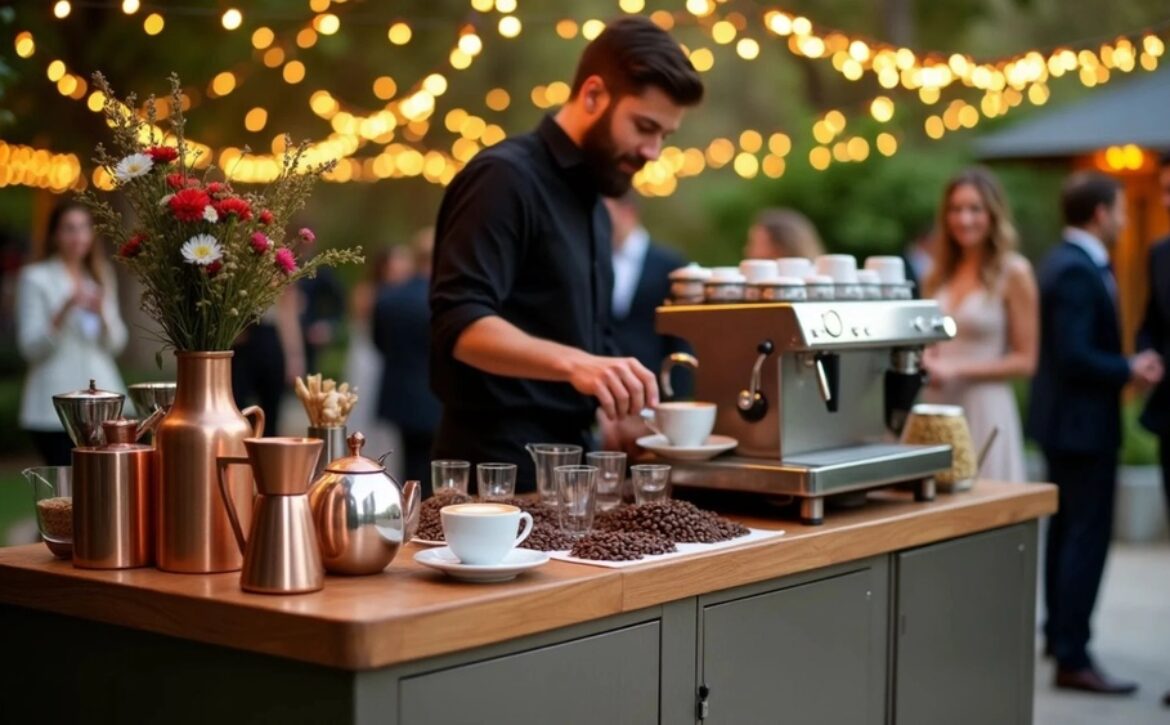
How to Become a Barista & Coffee Making: Expert Tips
Imagine waking up every morning excited to craft the perfect cup of coffee. Picture yourself working in a vibrant café, surrounded by the comforting aroma of freshly brewed espresso.
If you love coffee and enjoy making others smile with a warm, delicious drink, becoming a barista might just be your dream career. In this guide, you’ll discover the steps to turn your passion into a rewarding profession. We’ll explore the skills you need, the tools you’ll work with, and the secrets to making coffee that keeps customers coming back for more.
Ready to start your journey to becoming a barista and mastering the art of coffee making? Let’s dive in and get you brewing with confidence.
:max_bytes(150000):strip_icc()/FAW-Breville_BaristaTouch_BES880_23-CoffeeMakers-0763-Russell-Kilgore-3x2-fbbd28003fd8427e8337cf2eeba7e9b1.jpeg)
Barista Basics
Learn the essentials to become a barista and create delicious coffee. Gain skills in brewing, steaming milk, and crafting espresso drinks. Understand coffee beans and equipment to serve quality cups every time.
Becoming a barista is more than just making coffee; it’s an art and a science wrapped in a steaming cup of joy. Whether you’re dreaming of crafting the perfect cappuccino or understanding the rich tapestry of coffee varieties, starting with the basics is crucial. Let’s dive into the foundational skills every aspiring barista needs to master.
Essential Skills
A great barista knows more than just how to brew a cup of coffee. Attention to detail is key when measuring coffee grounds or timing your brew. Can you taste the subtle notes of chocolate or berry in your morning cup? Developing a refined palate will help you create better coffee experiences. Communication skills are just as crucial. You’ll need to understand customers’ preferences and suggest drinks that match their tastes. These interactions can turn a quick coffee run into a memorable experience.
Understanding Coffee Varieties
Do you know your Arabica from your Robusta? Understanding coffee varieties can transform your approach to making coffee. Each type of bean offers different flavors and brewing challenges. Take the time to taste and compare beans from different regions. This will expand your knowledge and skill set. Consider hosting a coffee tasting with friends to explore these diverse flavors together. It’s a fun way to learn and share your passion for coffee.
Equipment Knowledge
The right equipment can make or break your coffee-making journey. Familiarize yourself with grinders, espresso machines, and milk frothers. Do you know how to adjust your grinder for the perfect espresso shot? Experimenting with different settings will lead to better results. Maintenance is also essential. Regularly cleaning your equipment will ensure it lasts longer and performs better. This not only saves money but also guarantees a consistently great cup of coffee. By mastering these barista basics, you set a strong foundation for your coffee-making journey. What’s your next step in becoming a barista?
:max_bytes(150000):strip_icc()/FAW-Breville_BaristaExpress_BES870XL_22-0791-Russell-Kilgore-3x2-1-2e0238f489bf4a92a01770a3bdc8daef.jpeg)
Training And Certification
Training and certification are crucial for aspiring baristas. These steps ensure you have the skills and knowledge needed. With proper training, you can create delicious coffee drinks. Certification adds credibility to your skills. It shows your dedication to the craft. Both elements are vital in building a successful career in coffee making.
Barista Training Programs
Barista training programs teach essential skills. They focus on using espresso machines and grinders. You learn to steam milk to perfection. Programs cover coffee bean selection and storage. Many include customer service tips. These programs help you understand the entire coffee-making process.
Some programs offer hands-on experience. This is crucial for skill development. Classes often include practice sessions. Here, students make various coffee drinks. These sessions build confidence and expertise. Many training programs are available online. Others occur in-person at local coffee shops or schools.
Certification Options
Certification can boost your career as a barista. Several organizations offer recognized certifications. The Specialty Coffee Association (SCA) is one example. Their certification programs cover different skill levels. From beginner to advanced, there’s a suitable option.
Another option is the Barista Guild. They offer certifications focused on practical skills. These certifications prove your competence. They can enhance your resume. Certification demonstrates commitment to quality. Employers often prefer certified baristas. It can open doors to better job opportunities.
Coffee Brewing Techniques
Brewing coffee is a delightful art. Each technique offers unique flavors and aromas. Exploring different methods can enhance your coffee experience. Mastering these techniques is key for aspiring baristas. Learn how to brew coffee like a pro.
From rich espressos to smooth pour-overs, each method has its charm. Discover the secrets behind each brew. Enhance your coffee skills with these techniques.
Espresso Mastery
Espresso is the heart of many coffee drinks. It packs a punch with its strong flavor. Using a machine is essential for making espresso. Ensure the beans are finely ground. The right pressure and temperature are crucial.
Timing is everything. A perfect shot takes about 25 to 30 seconds. Practice is important for achieving a balanced taste. Espresso is both science and art.
Pour Over Methods
Pour over offers a slow, gentle brew. It highlights the coffee’s natural flavors. Use a dripper and filter for this method. Start with freshly ground beans. Pour water evenly over the grounds.
Control the water flow for a balanced extraction. The process is calming and rewarding. Pour over allows for precise flavor control. It’s perfect for coffee enthusiasts.
French Press Techniques
French press makes a rich, full-bodied coffee. It requires coarsely ground beans. Combine hot water and coffee in the press. Let it steep for about four minutes.
Press the plunger down slowly. This separates the grounds from the liquid. The result is a robust and aromatic brew. French press is simple yet effective.

Creating Signature Coffee Drinks
Creating signature coffee drinks can elevate a barista’s craft to an art. It’s about blending unique flavors and presenting them beautifully. Signature drinks stand out and attract loyal customers. They require creativity, skill, and a deep understanding of coffee.
Latte Art Skills
Latte art is more than pouring milk. It’s an expression on a cup. Perfecting it takes practice and patience. Focus on the basics first. Start with simple shapes like hearts and leaves. Gradually, move to complex designs. Use fresh milk for a smooth texture. The right temperature helps create perfect foam. Regular practice sharpens skills. Experiment with different pouring techniques. Each pour creates a unique pattern. Aim for precision and elegance.
Flavor Pairing Insights
Flavor pairing adds depth to coffee drinks. Understand the flavor profiles of different beans. Balance sweetness with bitterness for a pleasant taste. Use spices like cinnamon or nutmeg for warmth. Chocolate and caramel add richness. Fruits like orange or raspberry offer freshness. Create harmony in every sip. Experiment with unusual combinations. Find the perfect blend that excites taste buds.
Seasonal Specialties
Seasonal specialties keep menus exciting. They reflect the time of year. Use ingredients that are fresh and available. Pumpkin spice is popular in autumn. Winter calls for peppermint and gingerbread. Spring brings floral notes like lavender. Summer loves berries and citrus. Tailor drinks to seasonal moods. Customers appreciate variety and creativity. New flavors can become a favorite treat.
Customer Service Excellence
Aspiring baristas can achieve customer service excellence by mastering coffee-making skills and engaging warmly with patrons. Crafting delicious beverages while maintaining a friendly atmosphere enhances the overall experience for coffee lovers. Balancing precision and personality leads to memorable moments, ensuring customers return for more delightful sips and smiles.
Customer service excellence is the heartbeat of any successful barista career. It goes beyond serving a well-crafted cup of coffee; it’s about creating a memorable experience for every customer. Whether you’re an aspiring barista or a seasoned professional, mastering customer service can set you apart in the bustling world of coffee making.
Engaging With Customers
Building rapport with customers starts with a simple smile and greeting. Make them feel welcome as soon as they step into the cafe. Ask about their day or suggest a new coffee blend. Being genuine can turn a regular customer into a loyal one. Share your passion for coffee, and they might share theirs too. You never know; a brief chat could brighten someone’s day. Consider your own coffee shop visits. Do you remember the barista who knew your name and favorite drink? Aim to be that memorable.
Handling Feedback
Feedback, both positive and negative, is a tool for growth. Listen actively when a customer shares their thoughts. It shows respect and willingness to improve. Positive feedback can reinforce good practices. Acknowledging it can boost your confidence and motivate you to maintain high standards. Negative feedback, though hard to hear, is invaluable. Approach it as a chance to learn. Thank the customer for their honesty and make necessary changes. Have you ever received feedback that changed your approach? Use these moments to refine your skills and enhance the customer experience.
Career Advancement
Embarking on a career as a barista opens doors to more than just crafting the perfect cup of coffee. It’s a journey filled with opportunities for growth and creativity. Career advancement in the coffee industry is about expanding your skills, building connections, and pushing boundaries. Whether you dream of leading your own coffee shop or becoming a renowned coffee expert, there are strategic steps to accelerate your career.
Building A Coffee Network
Networking is key in the coffee world. Start by connecting with fellow baristas, coffee shop owners, and industry experts. Attend local coffee events and workshops to meet like-minded individuals.
Building relationships can lead to unexpected opportunities. A casual chat with a coffee enthusiast could land you an invitation to a coffee tasting event.
Consider joining coffee-related groups on social media. Share your experiences, ask questions, and offer advice. These platforms are a treasure trove for learning and connecting.
How can you leverage these connections for career growth? Perhaps someone in your network needs a barista for an exclusive event, or there’s a job opening at a renowned cafe. Opportunities are everywhere; it’s up to you to seize them.
Exploring Coffee Competitions
Participating in coffee competitions is a thrilling way to showcase your skills. It challenges you to refine your craft and learn new techniques. You’ll gain invaluable experience and visibility.
Research local and national coffee competitions. Many offer categories for different skill levels, so don’t hesitate if you’re a beginner. Winning isn’t everything; the experience and exposure are priceless.
Imagine standing in front of a panel of judges, presenting your signature brew. The pressure may be high, but the learning curve is steeper. Each competition is a stepping stone in your career, opening doors to new connections and opportunities.
Have you considered how competition could elevate your career? It’s not just about winning—it’s about growth, learning, and expanding your horizons. Are you ready to take the plunge?
Sustainability In Coffee
Sustainability in coffee is vital for the planet and the industry. Coffee lovers are increasingly aware of environmental impacts. Baristas play a role in promoting sustainable practices. Understanding ethical sourcing and eco-friendly methods can make a difference.
Ethical Sourcing
Ethical sourcing ensures fair treatment of coffee farmers. Coffee should come from farms with fair wages. This supports communities and improves lives. Look for certifications like Fair Trade. These guarantee fair practices and sustainable farming. Ethical sourcing reduces exploitation and encourages respect. It builds trust between consumers and producers.
Eco-friendly Practices
Eco-friendly practices minimize environmental harm. Choose coffee beans grown without harmful pesticides. Organic farming protects soil and biodiversity. Use reusable coffee cups to reduce waste. Compost coffee grounds instead of throwing them away. This enriches soil and reduces landfill waste. Support coffee shops that practice recycling. Sustainability should be part of every coffee-making step.
Frequently Asked Questions
What Skills Are Needed To Become A Barista?
To become a barista, you need excellent customer service skills, the ability to multitask, and attention to detail. Understanding different coffee beans and brewing techniques is essential. Baristas should also have a creative flair for latte art. Good communication and teamwork skills are also important in a fast-paced environment.
How Long Does Barista Training Take?
Barista training typically takes a few weeks to a few months, depending on the program. Many coffee shops offer on-the-job training. Some baristas opt for specialized courses to refine their skills. Continuous practice is key to mastering techniques and gaining confidence in coffee preparation.
What Equipment Do Baristas Use Daily?
Baristas use espresso machines, grinders, milk frothers, and coffee makers daily. They also use scales for precise measurements and tampers for compressing coffee grounds. Cleaning equipment, such as brushes and cloths, is essential for maintaining machines. Knowledge of this equipment ensures efficient and consistent coffee preparation.
Is A Barista Certification Necessary?
A barista certification isn’t necessary, but it can enhance your credibility and skills. Certification programs provide structured training and industry-recognized credentials. These programs often cover coffee knowledge, equipment use, and customer service. However, hands-on experience is equally valuable in becoming a successful barista.
Conclusion
Becoming a barista is an exciting journey. Start with learning coffee basics. Practice making different coffee drinks. Get familiar with coffee machines and tools. Explore different coffee beans and flavors. Take barista courses for deeper knowledge. Gain experience by working in cafes.
Stay curious and keep experimenting with new techniques. Enjoy the process of serving delightful coffee. Building a career in coffee is both rewarding and fulfilling. Remember, each cup tells a story. Keep improving your skills and sharing your passion. Your journey as a barista can bring joy to many coffee lovers.





